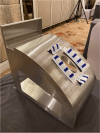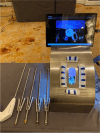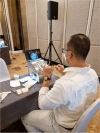Role of surgical simulation on self-reported confidence level on cardiothoracic surgical trainees
- PMID: 38760859
- PMCID: PMC11102198
- DOI: 10.1186/s13019-024-02647-5
Role of surgical simulation on self-reported confidence level on cardiothoracic surgical trainees
Abstract
Background: Simulated self-practice using simulation models could improve fine motor skills and self confidence in surgical trainees.
Aims: The purpose of this study is to evaluate on self-reported confidence level in cardiothoracic surgical trainees by using surgical simulation models.
Methods: We conducted a cross-sectional study on all surgeons (n=10) involved in MIS simulation training. All surgeons are required to perform on three minimally invasive surgery (MIS) procedures (Mitral Valve Repair, Mitral Valve Replacement and Aortic Valve Replacement). A questionnaire was designed based on two existing scales related to self-confidence, the surgical self-efficacy scale [SSES] and the perceived competency scale [PCS]. We assessed their self-confidence (before and after training) in the use of simulation in MIS procedures using rating scales 1-5. The mean score was calculated for each domain and used as the predictor variable. We also developed six questions (PCS) using Objective Structured Assessment of Technical Skills (OSAT) related to each domain and asked participants how confident they were after performing each MICS procedure.
Results: The mean score was 4.7 for all assessed domains, except "knowledge" (3.8). Surgeons who had performed one or more MIS procedures had higher scores (P<0.05). There was no correlation between the number of MIS procedures performed and self-confidence scores.
Conclusions: The results indicate that the cardiac surgery training based on MIS simulation improves trainees and consultants in terms of the level of self-confidence. Although surgeons generally have high levels of self-confidence after simulation training in MIS cardiac procedures, there is still room for improvement with respect to technical skills related to the procedure itself and its results.
Keywords: Confidence level; Minimally invasive cardiac surgery; Simulation.
© 2024. The Author(s).
Conflict of interest statement
The authors declare no competing interests.
Figures






References
Publication types
MeSH terms
LinkOut - more resources
Full Text Sources
Medical

